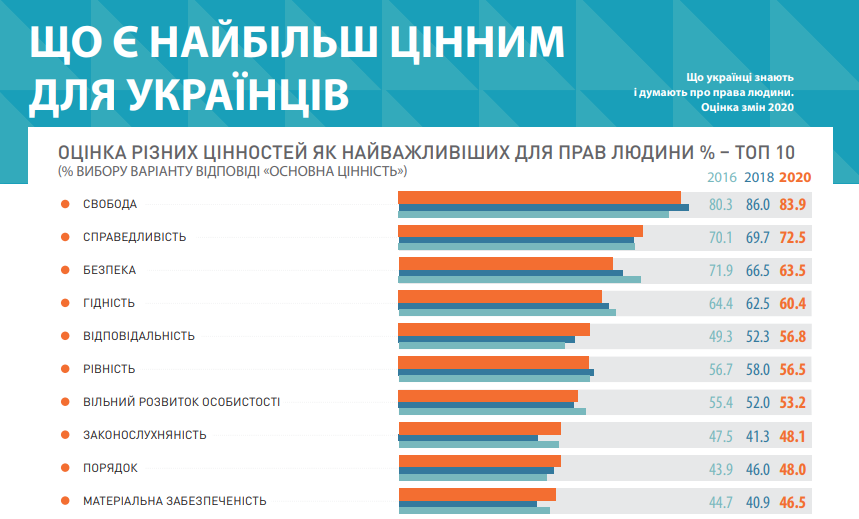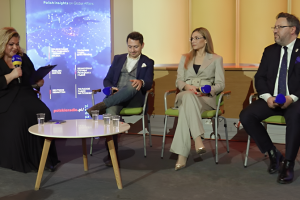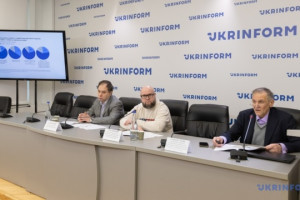Ukrainians became more tolerant and active in defending their rights: results of the survey
UNDP in Ukraine presents the results of the third wave of sociological survey that shows changes in Ukrainians’ perception of human rights since 2016.
Kyiv, December 10, 2020 – The results of the third wave of the national sociological survey "What Ukrainians know and think about human rights: assessment of changes (2016 - 2020)" were presented on Human Rights Day. The survey was conducted in 2020 by the Ilko Kucheriv Democratic Initiatives Foundation in cooperation with the ZMINA Human Rights Centre supported by the United Nations Development Program (UNDP) in Ukraine.
The top priorities for Ukrainians continue to be freedom (84 percent of respondents said it was core value), justice (72 percent), and security (63 percent). However, compared to 2016, the importance of security for Ukrainians as a fundamental value has decreased by 8 percent. Compared with the results of polling in 2016, the number of Ukrainians for whom tolerance is a fundamental value increased in 2020 by 6 percent – one-third of Ukrainians consider it to be a fundamental value.
This is the third large-scale survey of human rights in Ukraine conducted by UNDP and its partners, but this year the results of the polling were affected by the global crisis caused by the pandemic. This might be the reason for some of the changes identified by the study, among which are some positive tendencies. Specifically, Ukrainians became more active in defending their rights and more tolerant of each other, according to Svitlana Kolyshko, Human Rights Team Lead and UNDP Ukraine Project Manager
“The COVID-19 pandemic affected everyone and made Ukrainians re-evaluate their views and attitudes to each other,” Kolyshko said. “Tolerance and respect for human rights should be at the forefront of the response to the global crisis. They will help Ukraine to move forward in achieving the Sustainable Development Goals and the Agenda 2030.”
Compared with 2018, this year’s results show that Ukrainians’ willingness to agree to restrictions on the rights of certain social groups has decreased, specifically their readiness to restrict the rights of former convicts (-3.8 percent), representatives of the LGBTQI + community (-3.2 percent), persons with drug addictions (-1.8 percent), homeless people (-1.8 percent), people with specific political views (-1.6 percent) and Roma people (-1.4 percent).
Ukrainians score the observance of human rights below average levels. Specifically, on a scale of 1 to 5, the observance of cultural rights was scored as 3.2 points, political rights – the right to choose authorities, to establish political parties or civil society organizations, the right to freedom of assembly – scored 3.1 points, fundamental rights – right to life, personal freedom, freedom of speech – were scored as 2.9 points, ecological, and social and economic rights – 2.5 points.

Andriy Sukharyna, a political analyst at the Ilko Kucheriv Democratic Initiatives Foundation, said that this year the assessment of how different rights are observed has somewhat improved compared to 2016 and 2018.
“Respondents better assessed political and cultural rights’ observance in 2020 compared to previous years,” Sukharyna said. “However, most of the scores remain low, specifically, the observance of social and economic rights, or ecological rights, are assessed by the respondents as being below a satisfactory level.”
During the COVID-19 crisis, Ukrainians have become more active in defending their rights. The number of respondents who have tried to defend their rights increased from 42 percent in 2016 up to 60 percent in 2020. The number of men and women who succeeded in defending their rights also increased, from 14.5 percent in 2016 to 19.3 percent in 2020.
However, along with legal mechanisms of defending their rights like going to court (16 percent), Ukrainians used non-legal methods, such as turning to relatives or friends for help (15 percent).
In 2020, the attitude of Ukrainians to lynch law changed. In 2020, 60 percent of respondents consider lynch law unacceptable, while in 2016 only 50 percent of respondents thought so. At the same time, since 2016, the share of respondents who are willing to justify taking the law into their own hands under certain circumstances, as well as those who consider it the only possible way to protect their rights, has significantly decreased.
The survey shows that during the past year, 85 percent of Ukrainians have not participated in any protest action, even on social media. Along with this, about 25 percent think that the most effective way to protect rights is to address the media, while 22 percent think that there are no effective mechanisms to protect their rights.
“Though the number of people supporting lynch law has decreased, still about half of Ukrainians do not believe in state mechanisms to protect their rights,” said Volodymyr Yavosrky, an expert from the ZMINA Human Rights Centre. “This demonstrates a long-lasting crisis in the judiciary and law-enforcement spheres. Weak mechanisms to protect rights and lack of trust leads to a decline in people’s activeness in protecting their rights. This might cause negative tendencies, as the human rights situation improves in those countries where people stand up for their rights,” said Yavosrky.
Check here for more results
Background information:
This is the third nationwide survey “What Ukrainians Know and Think About Human Rights” conducted by the Ilko Kucheriv Democratic initiatives foundation in cooperation with the ZMINA Human Rights Centre with the support of the Human Rights for Ukraine project, which is implemented by UNDP Ukraine and financed by the Ministry of Foreign Affairs of Denmark.
The results of the previous studies conducted in 2016 and 2018 are available at the website.
The opinions, attitudes, and assessments contained in the research do not necessarily reflect those of the Ministry of Foreign Affairs of Denmark, the United Nations Development Programme, or other UN Agencies








